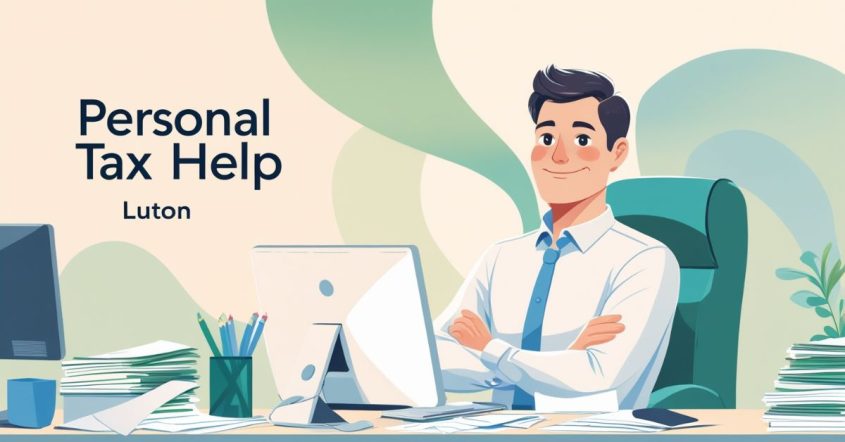When tax season rolls around, many individuals in Luton feel overwhelmed by the paperwork, calculations, and ever-changing HMRC rules. Whether you’re self-employed, a landlord, or someone with multiple income streams, filing personal taxes correctly is not only a legal obligation but also a financial opportunity. Done right, it can help you save money, avoid penalties, and gain peace of mind. That’s where personal tax accountants come in. These professionals can guide you through the process, highlight allowances and deductions you might miss, and ensure that your return is accurate and compliant with UK regulations. Especially in a growing town like Luton, which has a mix of entrepreneurs, remote workers, and property owners, tailored tax advice is more important than ever. Getting the right personal tax help can make a huge difference in your financial well-being. In this article, we’ll walk you through what you need to know before filing, how to choose a reliable expert, and why working with a UK-based firm could save you time and money.
Understand Your Tax Situation
Before contacting a tax advisor or submitting your self-assessment, it’s important to understand the basics of your financial situation. Are you employed with additional side income? Do you earn rental income from a property in Luton? Are you eligible for any tax reliefs or allowances? Knowing where you stand will help your accountant give you better advice.
Here are some common scenarios that may require expert tax help:
- Earning income from self-employment or freelancing
- Owning a rental property
- Receiving dividends or foreign income
- Claiming tax relief on pensions or charitable donations
If any of these apply to you, it’s worth reaching out to personal tax accountants for a clear understanding of your obligations and opportunities.
Benefits of Hiring a Local Tax Accountant in Luton
Hiring a professional based in Luton offers several advantages. Local experts understand regional property rates, employment trends, and council-specific tax rules that could affect your return.
Some key benefits include:
- Easy communication and in-person meetings if needed
- Familiarity with Luton-specific issues like commuter expenses or local housing allowances
- Tailored advice for residents with complex income streams
Many individuals make the mistake of relying solely on online calculators or generic advice. However, a qualified personal tax accountant in Luton can provide targeted guidance that reflects your unique circumstances. If you’re searching for a reliable option, consider exploring UK-based tax advisory platforms like Account Ease, where experienced professionals offer services designed specifically for individuals and businesses across the UK, including Luton.
What to Bring to Your Tax Appointment
Preparation is key to making the most of your consultation. Here’s what you should gather before meeting with your tax advisor:
- Payslips or P60/P45 forms
- Details of self-employment income and expenses
- Rental income records and mortgage statements
- Dividend and investment income
- Pension contributions and tax relief documents
- Records of charitable donations
Having these documents ready helps your accountant file your return faster and spot deductions you might otherwise overlook. If you’re already working with personal tax accountants, they’ll likely provide you with a checklist to simplify this process.
Look for Qualifications and Transparency
Not all accountants are created equal. When choosing someone to handle your taxes, it’s essential to check their credentials. Look for professionals who are certified by reputable UK bodies such as:
- Association of Chartered Certified Accountants (ACCA)
- Chartered Institute of Taxation (CIOT)
- Institute of Chartered Accountants in England and Wales (ICAEW)
In addition to qualifications, consider how they communicate. Do they explain things in plain English? Are their pricing structures easy to understand? A transparent and approachable tax advisor builds trust and ensures you’re never left in the dark. You’ll find that many UK-based services emphasize these qualities, and this is where platforms like Account Ease tend to stand out by offering accessible, user-friendly support tailored to UK taxpayers.
Common Mistakes to Avoid When Filing Taxes
[Insert Image]
Even small mistakes on your tax return can lead to delays, penalties, or unnecessary stress. Avoid the following errors:
- Missing the deadline (usually 31 January for online self-assessments)
- Forgetting to declare income from all sources
- Overlooking eligible deductions or reliefs
Entering incorrect figures without double-checking - Filing without keeping supporting records
Working with personal tax accountants helps reduce these risks. They’ll cross-check everything and make sure your return is both accurate and beneficial to your financial goals.
Final Thoughts
Filing your taxes doesn’t need to be a stressful process. With the right preparation and professional support, it can become a routine part of your financial year. In a town like Luton, where income sources vary widely and regional nuances matter, working with personal tax accountants ensures that you’re not only compliant but also making the most of what you’re entitled to. Local, UK-based firms provide a balance of accessibility and expertise, helping individuals feel more confident about their finances. Whether you’re filing for the first time or seeking to improve on last year’s return, the right tax advisor can help you avoid mistakes, save money, and file with peace of mind.
FAQs
1. Do I need to file a tax return if I’m employed and pay through PAYE?
You might not need to, but if you have additional income like freelance work or rental earnings, you’ll likely need to complete a self-assessment.
2. How do I find a trusted tax advisor in Luton?
Start by looking for qualified personal tax accountants with strong reviews and UK certifications. A local firm or a UK-based website with tailored services can be a good fit.
3. Can I file my taxes without an accountant?
Yes, but working with a professional helps reduce the risk of errors, maximizes your deductions, and ensures you’re fully compliant with HMRC.
4. When is the deadline to file personal taxes in the UK?
The deadline for online submissions is 31 January, following the end of the tax year. Paper returns are due earlier, by 31 October.
















